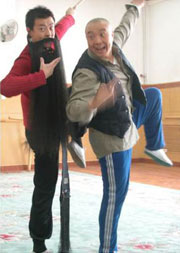
This photo, taken during
the Faculty of Fine Arts trip to China, demonstrates how architecture
blends with natural beauty at the Shanghai Gardens.

A student and instructor
practise their moves at the Academy of Chinese Traditional Opera, in
Beijing. The student is wearing a wig that goes with his character.
Photos by PK
Langshaw
|
It started last summer, when a delegation from several major
Chinese institutions visited Concordia. In November, a group from the
Faculty of Fine Arts visited China. They were Dean Christopher Jackson,
Associate Dean Liselyn Adams, chair of cinema Catherine MacKenzie, cinema
professors Peter Rist and Christopher Hinton, and PK Langshaw, chair of
the Department of Design Art.
They visited the Shanghai Animation Studio, the Beijing Broadcasting Institute,
the Beijing Film Academy and China’s Film Archives, but their primary
host was the Academy of Chinese Traditional Opera, whose name belies its
current activity, according to Dean Jackson. While they are certainly
maintaining the ancient arts, the teachers at the Academy are using all
the new tools available to artists here, including digital animation.
The same is true of the Central Academy of Fine Arts, where the group
from Concordia were floored by the range and depth of students’ work.
“The culture in general is just so rich,” Jackson said.
Catherine MacKenzie said, “It was an exciting trip,
for any number of reasons, but most importantly because we were able to
determine that there were all kinds of possibilities for collaboration
between institutions in China and our cinema programs.
“We were excited by the art production we saw in China, and want
to begin as quickly as possible to begin to work with the faculty and
students we met.
“We were excited to learn that Concordia’s Mel Hoppenheim School
of Cinema School and the Faculty of Fine Arts are highly regarded among
the institutions we visited — and not simply known, but known for
the quality of our work. It was gratifying to be treated with such respect
and admiration.
“[We had] a real sense of envy for the place that the arts are given
in China; we were staggered by the facilities which are made available
to students, and the seriousness with which their activities are taken.”
PK Langshaw echoed these sentiments about the Academy of Traditional Opera
and the Central Academy of Fine Arts, in Beijing. While it is a longstanding
institution, CAFA moved into an extraordinary new complex of buildings,
green space and facilities for teaching both the traditional and digital
arts.
She also liked what she saw and heard regarding teaching. “The professors
we met were progressive and open, and they welcomed ideas for collaboration,”
she said. “The Academy has strong curricula and program initiatives,
including extensive teaching residencies for visiting professors in all
areas of the visual arts.
At the Academy, she was was intrigued by the storytelling, elaborately
symbolic gestures and sound, intricate costumes and rigorous athleticism.
“The opera academy has much to offer us in traditional performance,
but they are inviting us to provide the catalyst for exploration into
hybrid forms of performance and related digital arts.”
Langshaw said that when she first arrived in China, she felt exhilarated
but “ungrounded,” as there was so much to take in _ language,
culture and environment — but she could also see that much change
was going on in the cities. “Between Christopher Hinton and myself,
we probably have 2,000 photos, because our cameras were with us all the
time.”
Langshaw, who specializes in text-based design and has long been fascinated
by the rich traditions of Chinese calligraphy, added that she was able
to take in a spectacular calligraphy and seal exhibition at the Shanhai
museum.
Agreements were signed both with the Academy of Chinese Traditional Opera
and the Beijing Film Academy, and if finances ever permit, exchanges may
result. The possibilities are many: exchange of faculty members (teaching,
guest lectures and joint research), graduate students, exhibitions and
performances. There was a return visit from Xiewei Song of the Central
Academy of Fine Arts in Beijing to the Design Art Department on Dec. 6
to pursue the possibility of an agreement.
|
|
|



